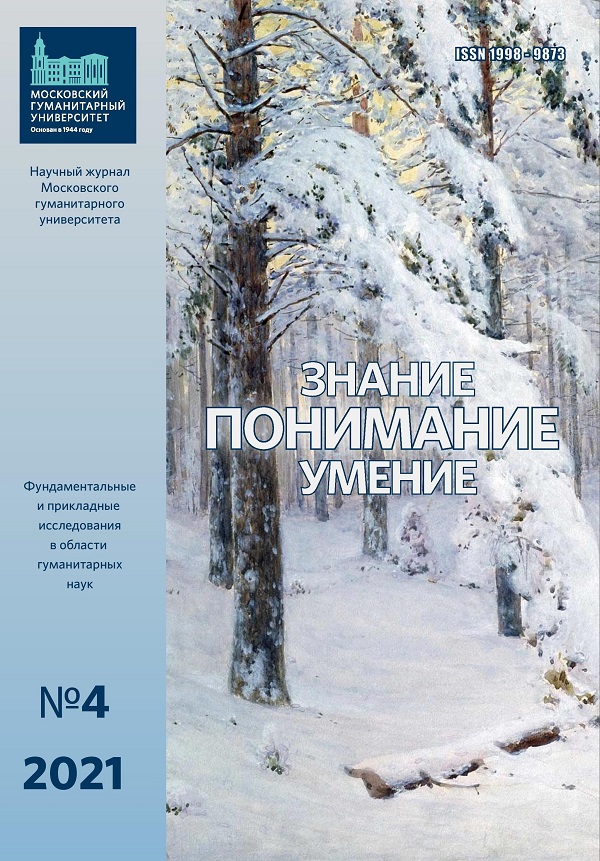Главная / Main Page / "Knowledge. Understanding. Skill" Journal / Contents / 2015 / №1
Kokoreva M. E. The Role and Functions of Family in Social Adaptation of Stroke Survivors
(Moscow University for the Humanities)
Abstract ♦ The article considers the role and functions of family in social adaptation of stroke survivors, who typically face problems of physiological, psychological and domestic nature which can significantly affect the quality of living.
The main goal of social adaptation is the rehabilitation of personality, with its physiological, psychological and social functions. It is achievable only by means of close intrafamily integration, when all family members support the post-stroke patient. The family alone can fully meet the needs and help rebuild the social status of the individual.
We have classified problems associated with the negative consequences of cerebral stroke into four major categories: physiological (neurological), cognitive, socio-psychological and problems of everyday life. In relation to each category, we have defined specific roles and functions of the family which have to be performed for successful adaptation of a stroke survivor.
Having analyzed the major material and moral problems the family faces, we argue that social workers must act as counselors, advising the families of stroke survivors on their needs, items of care and rules of communication with the patient. The article suggests a comprehensive model of intrafamily functional and role-based support which summarizes the basics of social adaptation of stroke survivors.
Keywords: stroke, post-stroke condition, family, social adaptation, rehabilitation.
Kokoreva Marina Evgenievna, Postgraduate student, Department of Sociology, Moscow University for the Humanities; Expert in social work, Center for Pathology of the Speech and Neurorehabilitation, Moscow. Postal address: 5 Yunosti St., Moscow, Russian Federation, 111395. Tel.: +7 (499) 374-60-21. E-mail: malinka7171@mail.ru. Research adviser: Doctor of History, Professor V.P. Moshnyaga.

Citation: Kokoreva M. E. (2015) The Role and Functions of Family in Social Adaptation of Stroke Survivors [ ]. Znanie. Ponimanie. Umenie, no. 1, pp. 282-288. (In Russ.). DOI: 10.17805/zpu.2015.1.27
Submission date: 25.11.2014.
RUSSIAN VERSION
REFERENCES
Alekseeva, V. M. et al. (2006) Mediko-sotsial'naia adaptatsiia bol'nykh, perenesshikh insul't, i kachestvo zhizni rodstvennikov, sovmestno prozhivaiushchikh s bol'nym, kak odin iz pokazatelei obshchestvennogo zdorov'ia [Medico-social adaptation of patients with stroke and the quality of life of cohabiting family members as indicators of public health] / V. M. Alekseeva, O. A. Shavlovskaia, N. V. Ekkert, K. I. Grishina and L. E. Dobrovol'skaia. Problemy upravleniia zdravookhraneniem, no. 1, pp. 76–80. (In Russ.).
Gusev, A. O. and Koval'chuk, V. V. (2010) Puti povysheniia urovnia sotsial'no-bytovoi adaptatsii patsientov, perenesshikh insul't [Ways of improving social adaptation of stroke patients]. Uchenye zapiski SPbGMU im. akad. I. P. Pavlova, vol. XVII, no. 3, pp. 23–27. (In Russ.).
Kim, L. M. (2012) Sotsial'no-psikhologicheskii analiz situatsii patsientov s elementarnymi dvigatel'nymi narusheniiami vsledstvie bolezni povrezhdennogo mozga [Socio-psychological analysis of a situation of patients with elementary motor function disturbances caused by injured brain]. Zdorov'e sem'i — 21 vek, no. 4, pp. 67–81. (In Russ.).
Klemesheva, Yu. N. and Voskresenskaya, O. N. (2008) Reabilitatsiia bol'-nykh insul'tom v Rossii [Rehabilitation of patients with stroke in Russia]. Nevrologicheskii zhurnal, vol. 13, no. 4, pp. 39–44. (In Russ.).
Kovaleva, A. I. (2003) Kontseptsiia sotsializatsii molodezhi: normy, otkloneniia, sotsializatsionnaia traektoriia [The concept of socialization of the youth: norms, deviations, social development trajectory]. Sotsiologicheskie issledovaniia, no. 1, pp. 109–114. (In Russ.).
Petrova, M. M. et al. (2014) Kognitivnye narusheniia posle insul'ta: proiskhozhdenie, vyiavlenie, lechenie [Post-stroke cognitive impairments: origin, detection, treatment] / M. M. Petrova, S. V. Prokopenko, T. D. Koriagina, T. V. Diadiuk and M. V. Rodikov. Consilium Medicum, vol. 16, no. 5, pp. 100–104. (In Russ.).
Son, A. S. and Mosenko, S. V. (2007) K voprosu otsenki sotsial'no-bytovoi adaptatsii bol'nykh s posledstviiami mozgovogo insul'ta [Assessing the social adaptation of patients with cerebral stroke]. Ukraїns'kii neirokhіrurgіchnii zhurnal, no. 3 (39), p. 22. (In Russ.).
Starodubtseva, O. S. and Begicheva, S. V. (2012) Analiz zabolevaemosti insul'tom s ispol'zovaniem informatsionnykh tekhnologii [Analysing the incidence of stroke with the use of information technology]. Fundamental'nye issledovaniia, no. 8-2. pp. 424–427. (In Russ.).
Umershie po osnovnym klassam prichin smerti [The deceased by major mortality causes]. (2014) Federal'naia sluzhba gosudarstvennoi statistiki. May 22. [online] Available at: http://www.gks.ru/free_doc/new_site/population/demo/demo24.xls [archived in WebCite] (accessed 13.01.2015). (In Russ.).
Yastrebtseva, I. P. and Novosel'skii, A. N. (2006) Otsenka sposobnosti k samoobsluzhivaniiu i sotsial'noi adaptatsii u postinsul'tnykh bol'nykh [An assessment of self-maintenance ability and social adaptation in post-stroke patients]. Vestnik Ivanovskoi meditsinskoi akademii, vol. 11, no. 3-4, pp. 36–38. (In Russ.).
|
|
 Вышел в свет
Вышел в свет
№4 журнала за 2021 г.
|
|
|
|